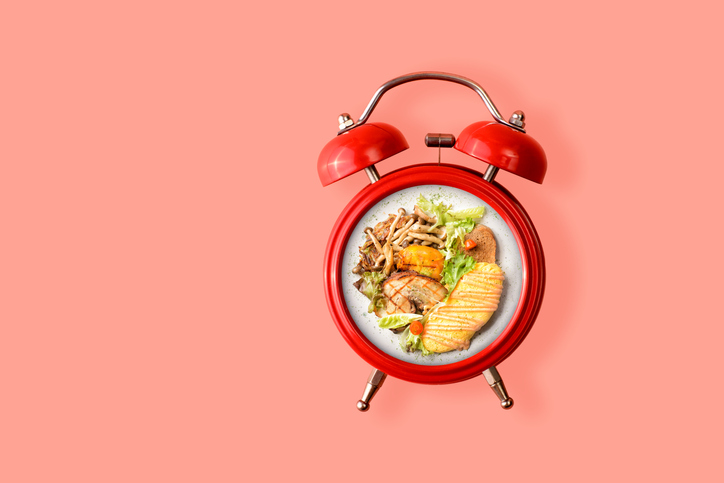What Is Calorie “Front-Loading,” And Should You Try It?

By Joy Stephenson-Laws, J.D., Founder
You have likely heard the saying that breakfast is the most important meal of the day. And many health and fitness professionals (for example, check out this study published by the National Institutes of Health (NIH)), have preached that making breakfast your highest calorie meal (and dinner your lowest) will help you lose weight. The concept is that doing this will help the body burn calories more efficiently and quickly throughout the day.
Although I agree that breakfast is an important meal, I don’t really like the idea of consuming the majority of my calories at breakfast.
For one, I’m an early riser (I’m talking 5 A.M.). So if I “spend” so many of my daily calories before noon, my fear is that I will not have enough remaining calories to get me through the day or that I might feel deprived. Secondly, I’m usually not very hungry in the morning and prefer a small breakfast.
Making breakfast the biggest meal is usually referred to as front-loading your calories.
One theory behind front-loading your carbs is that if you feel less hungry, especially earlier in the day, you may eat less during the remainder of the day and lose weight. But one could also argue that people may eat when they are not hungry due to multiple factors including stress, boredom, grief, drug-use and even excitement. At the end of the day, weight loss comes down to the math of calories consumed versus calories expended.

A recent study that analyzed front-loading involved overweight or obese people (who were otherwise healthy). The participants included 16 men and 14 women. At random, the participants were instructed to follow either a front-loaded/morning-loaded diet or an evening-loaded diet. Both diets had the same caloric value and macronutrient breakdown:
- 30 percent protein
- 35 percent carbohydrate
- 35 percent fat
Eventually, the participants switched diets. Activity levels were also assessed.
“Overall, the researchers found that energy expenditures and total weight loss were the same for the morning-loaded and evening-loaded diets. The subjects lost an average of just over 3 kg (about 7 pounds) during each of the four-week periods,” according to this Science Daily report that discusses the study.
More research is needed, but I think these findings suggest that there are many other important factors to consider when it comes to a personal diet and weight loss. You might want to consider the following:
- An eating plan that works for your friend, spouse or coworker, may not work for you. Some people may benefit from front-loading while others may feel it is not sustainable or helpful.
- The quality of the calories are important. There may not be much caloric difference between three scrambled eggs and a croissant, but the eggs are going to deliver protein and other nutrients that will help fuel your body and make you feel more satisfied. A croissant is essentially processed white bread that is mostly void of nutrients.
- Listen to your body. Within reason, I believe in intuitive eating. “Listen to your body, and don’t force breakfast if you lack any hint of hunger. I was wrong in telling my patients in my fresh out of school days to eat within an hour of waking. Your body will tell you when it’s time to eat, and when it’s time to stop eating. Listen to it,” according to one registered dietician. This does not mean that it is a good idea to skip breakfast and survive on coffee all morning.
At the end of the day, or perhaps I should say at the beginning of the day, strive to make healthy choices that work for you. This is why I highly recommend being proactive as soon as you open your eyes in the morning to help ensure a healthy and productive day. My mantra is to front-load healthy rituals in the morning to increase your chances for success. Some of these rituals or practices may include:
- Drinking a tall glass of water before your first cup of coffee
- Meditating before diving into your inbox
- Exercising
- Stepping outside into the sun to reset your circadian rhythm
- Making a nutrient-dense smoothie with five different colors: spinach (green), blueberries (blue), raspberries (red), cauliflower (white), banana (yellow)
- Reading something motivational and inspiring
Find what works for you, and don’t put pressure on yourself to be perfect. Consistency is key. For additional information on sustainable weight loss, check out these pH Labs blogs:
- Joy Stephenson-Laws of Proactive Health Labs On The 5 Things You Need To Do To Achieve a Healthy Body Weight, And Keep It Permanently
- Want to Reduce Body Fat? Try Resistance Training!
- How To Be Proactive About ‘Menopause Muffin Top’ & Metabolic Syndrome
- Shocking Truths About Dieting and Losing Weight!
- New Year, New Goals? Make Sure You Are Not Nutrient Deficient
Enjoy your healthy life!
The pH professional health care team includes recognized experts from a variety of health care and related disciplines, including physicians, attorneys, nutritionists, nurses, and certified fitness instructors. This team also includes the members of the pH Medical Advisory Board, which constantly monitors all pH programs, products, and services. To learn more about the pH Medical Advisory Board, click here.







